Aaron Swartz had always been ambiguous about marriage. But last December, having dated his girlfriend Taren Stinebrickner-Kauffman for 18 months, he seemed to be changing his mind.
"He said, sort of out of the blue, in the context of some conversation: 'Maybe we should get married?'" says Stinebrickner-Kauffman, sitting at a table by an open window in Heller's bakery in Washington DC, the humid breeze catching strands of her hair. "I was just so shocked. I asked: 'Where did that come from?' because he had never expressed anything positive about the idea of marriage before."
The 26-year-old Swartz was frequently described as a technological genius. At the age of 14, having dropped out of high school, Swartz helped to author the RSS web syndication specification that provided a standardised format to publish frequently updated works, such as blog entries, news headlines, audio and video content. At 19, he co-programmed the social news and entertainment website Reddit, which was sold to Condé Nast in 2006 for an undisclosed sum thought to be between $10m and $20m. In 2008, he co-wrote the Guerilla Open Access Manifesto, which called for activists to "liberate" information locked up by corporations or publishers. In 2010, at the age of 23, he co-founded Demand Progress, an online advocacy group that successfully campaigned against internet censorship bills and attracted more than a million members. By 24, Swartz was a Harvard research fellow conducting studies on political corruption.
A fierce proponent of the open access movement – which promotes free and easy access to the world's knowledge online – he was also a social activist, guided by an abiding fascination with what he saw as the corrupting influence of big money on institutions and the fundamental imbalance of power structures in the modern age.
"I've never met anyone so single-minded about changing the world," says Stinebrickner-Kauffman.
He read voraciously. One of his friends emailed me a list of books Swartz had read over a recent three-month period: there were 24 in total, including Susan Sontag's journals, The Principle of Hope by Ernst Bloch and a book on how to decode advertisements. He took in information and analysed it at a rapid rate, thirsty for knowledge about how the world worked and how it could be made better. He was obsessed by fonts: Helvetica was one of his favourites and he would choose restaurants according to what font they used on the menu. People called him a genius. His girlfriend remembers being woken up by Swartz one morning because he was desperate to hear her views on Bayesian statistics.
"Some of our biggest fights were about the nature of consciousness," she says, laughing, "often in the elevator in our building. We were yelling at each other about consciousness while the other people in the elevator were about to walk their dogs."
When Swartz mentioned marriage, she didn't take it too seriously. They joked about what kind of wedding they would have. Swartz said he wanted "a Liz Lemon wedding", a reference to Tina Fey's character in the sitcom 30 Rock who organised a last-minute marriage ceremony intended to be low-key and unsentimental. Stinebrickner-Kauffman wanted a big party, but Swartz was worried she would invite guests he didn't like. "And I said: 'We should talk about this after the trial is over,'" she recalls. "That kind of cut off the conversation."
"The trial" was a prospect that loomed large over their relationship. In July 2011 – a month after they started dating – Swartz was indicted on multiple felony counts for downloading several million academic articles from a subscription database called JSTOR. It was unclear what Swartz intended to do with the articles. He might have wanted to make them openly available to online users, believing as he did in the fundamental principle of freedom of information. He might have intended to analyse the data. Or he might have simply wanted to show it could be done. Whatever the reason, Swartz did not expect his actions to attract the full retributive force of the judicial authorities.
And yet that is precisely what happened. The apparent zeal with which US attorney Carmen Ortiz and Massachusetts assistant US attorney Stephen Heymann pursued the case took many by surprise but this was a post-WikiLeaks world, where large, powerful organisations were struggling to cope with the threat posed by internet hackers who could infiltrate government records and shut down entire online systems at the click of a computer mouse.
Despite Swartz's alleged crime having no discernible victims or personal financial gain, and despite the fact that JSTOR declined to pursue charges after he returned the articles, Ortiz issued a press release at the time of his indictment stating: "Stealing is stealing, whether you use a computer command or a crowbar."
It seemed like it had been decided that an example should be made. Aaron Swartz was it. The prosecutors were unwilling to compromise on jail time. In January 2013, less than three months before the criminal trial was set to begin, Ortiz's office formally rejected a deal that would have kept Swartz out of prison.
Two days later, on 11 January, Swartz hanged himself with his belt in the Brooklyn apartment he shared with his girlfriend. There was no suicide note. Stinebrickner-Kauffman was the one who found him when she got back from work. He was wearing the same clothes she had seen him in when she left for the office that morning: a V-neck black T-shirt and brown corduroy trousers. He had his coat on. When she called the emergency services, she was screaming so hard that at first they couldn't hear the address.
In the five months that have elapsed since that day, Stinebrickner-Kauffman has thought a lot about why her boyfriend killed himself. In the immediate aftermath of his death, she found the strength to speak at his memorial service, decrying the "unfair prosecution [and]... deeply dysfunctional criminal justice system" that had brought such intolerable pressure to bear on the man she loved. She spoke to a handful of reporters, did what she could to ensure that message spread. Then, exhausted, she took compassionate leave from her job as executive director of SumOfUs, a global protest movement that seeks to hold corporations to account, and retreated to Australia for two months. For a while, she simply didn't want to talk any more. This is one of the first interviews she has done since returning to work.
She says now that it would be too easy to explain away Swartz's suicide by saying he was depressed.
"I've read a lot about depression and it just doesn't sound like Aaron." When she speaks, she chooses her words cautiously. Her face is pale and tense, her eyes tired. Her every gesture seems to carry within it a sadness that is all the more unbearable for being contained.
"He didn't have an absence of joy. He didn't have an absence of human emotion… I think he was in a lot of pain. A lot of it was to do with the case. I don't think he would have killed himself if it weren't for the case, put it that way.
"The thing that I regret is that I didn't know I should be looking for anything… In retrospect, there are clues I could have picked up on and I just didn't know to.
"I think he made a really dumb decision. But I also think I understand how it happened. The biggest problem with the decision is that it's permanent. Other dumb decisions, you can usually recover from. People make mistakes." She breaks off and starts to cry, lowering her head as her shoulders shake. "It hurt me," she says finally, her voice quiet, "but I don't think it was his intention to do so."
Swartz's death prompted an outpouring of grief. For many in the online community, he had been both hero and pioneer: a man who used his technological ability not to become a multimillionaire Silicon Valley entrepreneur but, instead, to try and make things better for others. He was the poster boy for internet freedom. His ex-girlfriend, Quinn Norton, a tech journalist, was quoted in the New Yorker in March explaining the impact of Swartz's death. "If you look at 2011 to the present, there's an incredible emotional rollercoaster about internet freedom and the Arab revolutions," she said. "The internet was going to change everything and at the end of 2011 you had Occupy. And then everything just got destroyed. 2012 was the year, globally, for the heightening of censorship and the heightening of surveillance, and then Aaron killed himself. Aaron was so much the internet's boy, and that so much exemplified this machine crushing our hopes."
A remembrance website set up in the days after his death was inundated with tributes from all over the world – many from those who had never met him.
"I am so sorry about the tragic loss of Aaron," wrote a person called Ying Yan on 18 January. "Although I never met him… I admire and appreciate the great work he had accomplished. Like many, I will remember his tireless, selfless and astonishing effort to advance democracy. Like many, I will work to cherish that memory."
His friend Ben Wikler says that Swartz touched so many because he possessed "a staggering capacity for empathy, sometimes a crippling capacity".
His professional choices were guided by his conscience. In 2009, he chose to spend time as an intern in the congressional offices of Democrat Alan Grayson because he wanted to learn about how government operated before he set about the business of trying to improve it. Swartz had already compiled a report about the relation between candidates' wealth and their electoral success. During the period he spent in Grayson's office, he worked to help pass Obama's landmark healthcare reform. In 2010, he volunteered for the Democratic national convention in the runup to the midterm elections.
Unlike many social activists, who dismiss the political process as corrupt without seeking to understand what makes it so, Swartz was always seeking a deeper explanation from within the institutions he wanted to change.
Policy adviser and journalist Matt Stoller, who got him the placement with Grayson, was particularly struck by that fact.
"What kind of millionaire founder of a tech website chooses to spend time sitting in a congressional office to really understand the work flow?" Stoller asks, sitting in an office overlooking Capitol Hill. "No one. That doesn't happen… He was a basic technocratic liberal who thought that if you worked really hard, and approached a problem with openness and curiosity, then it was possible you could make life better for people."
Sometimes, this meant Swartz's standards were impossibly high. "He genuinely held other people as equally important as himself," says Wikler. "When he heard about injustice happening to someone else, it would be hugely taxing for him. He would feel a deep sense of obligation."
This obligation extended to a horror of imposing himself. Sometimes, this meant he acted strangely, as if he were lacking a necessary layer of protective skin. He felt uneasy dealing with taxi drivers or waiters, for instance, because he disliked the iniquitous distribution of power. He hated to feel a burden, even to his closest friends. When Wikler and his wife first invited Swartz to dinner, he didn't mention he suffered from ulcerative colitis, an inflammatory bowel disease, because he didn't want to bother anyone. "The bread was the only thing he could eat," Wikler recalls.
But it also meant that he felt obliged to try and change the world. As an example of this moral imperative, Wikler cites a conversation he had with Swartz four years ago about the extent of an individual's ethical duty. They began discussing Thomas Keneally's book Schindler's Ark, which tells the story of a German industrialist who saves the lives of more than 1,000 Polish Jews during the Holocaust. In the book and the subsequent film adaptation (as Schindler's List), Schindler is tormented by the fact that he didn't do enough and could have sold his car to save more people.
In August 2009, Swartz sent an email to Wikler. "So let's take the case we're both in, where we spend our days on social justice work and have a nagging voice at the back of our heads when we go to the movies," he wrote. "I find the guilt and the passion pretty much indistinguishable. Both want me to spend more time on my work, since that's what I find fulfilling and important. And while I don't usually live by these principles (obviously, I still go see movies and watch TV), I'm much happier when I do… So I guess I don't see the trade-off. Schindler should have sold the car: he would have saved lives and been happier too."
His close friend Alec Resnick saw something similar at work. "Disengagement was never his response," he says. "Aaron saw things as systems that needed to be tweaked." Was he ever contented? "Never."
Aaron Swartz was born in 1986, two years after the US government passed the Computer Fraud and Abuse Act, which was later used to indict him. At the age of three, he taught himself to read. His father, Robert, a computer consultant, remembers Swartz reading aloud a note stuck to the refrigerator in the family home in Highland Park, a wealthy suburb some 20 miles north of Chicago, much to the astonishment of his mother.
"He certainly seemed very bright," says Robert Swartz, speaking over the phone. "We realised when he was a few years old he was progressing on an intellectual level faster than his friends."
The eldest of three brothers, Swartz was perpetually curious and fascinated by computers and puzzles from an early age. As a teenager, he dropped out of high school because he was bored by it. At the time, he wrote a blog post about his disenchantment with organised education: "Seriously, who really cares how long the Nile river is, or who was the first to discover cheese?" he typed. "How is memorising that ever going to help anyone?"
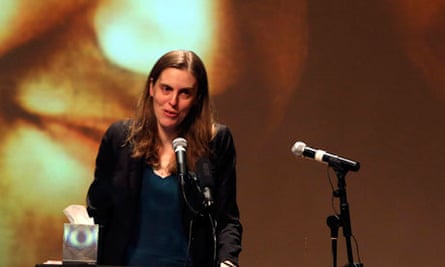
His parents were supportive but insisted he carried on taking classes at a local community school. Meanwhile, Swartz's social life began to thrive online. He became a talented software engineer and attended conferences with like-minded computer programmers, many of whom were shocked to discover that the sophisticated coder they'd met online was actually a 14-year-old geek wearing a T-shirt three sizes too big for him.
Later, he went to Stanford University. Again, he found the rules pointless and stifling and he dropped out after a year to build a website that would help people build data-driven, content-rich websites. The website failed but his original investor suggested he merge it with a start-up called Reddit, which he did in 2005, contributing his considerable programming skills to streamlining the site.
A year later, Reddit was attracting millions of users each month and was acquired by Condé Nast. For a brief time, Swartz worked at Wired magazine in San Francisco as part of the buyout deal but he disliked the restrictions of office life and soon left for Cambridge, Massachusetts, where he felt most at home, partly because of the thriving hacking community based around the Massachusetts Institute of Technology.
MIT had a long and noble history of celebrating the anarchic and innovative cult of the hacker. In the early days of internet research when the university's few computers were kept in locked rooms, MIT hackers used to pick locks or crawl through ceiling vents in order to gain access. Their view, as espoused by the internet's founder Tim Berners-Lee, was that the internet was "for everyone".
This chimed with Swartz's personal philosophy, outlined in the Guerilla Open Access Manifesto. "Information is power," it read. "But like all power, there are those who want to keep it for themselves... Those with access to these resources... have a duty to share it with the world."
Swartz had already experimented with making large stashes of public documents available online without charge and on 24 September 2010, he bought an Acer laptop and started to download academic journals from the JSTOR database. When the network detected something was amiss, Swartz's IP address was blocked. He then wired a hard drive directly into the MIT network and was filmed by a surveillance camera apparently attempting to retrieve his laptop from a university building. On 6 January 2011, Swartz was arrested.
Was he committing a crime? While authorised users are theoretically allowed to download as much as possible from JSTOR, this is only after paying an annual subscription fee – major institutions pay up to $50,000 for the privilege. Its terms of service also prohibit the use of programs to aid bulk downloading.
There was little doubt that what Swartz was doing was wrong, but his actions didn't seem to be malevolent or worthy of a 35-year jail term. His defence lawyer, Elliot Peters, later described the material Swartz downloaded as "a bunch of, like, the 1942 edition of the Journal of Botany!"
Swartz's father remains quietly furious about the way the subsequent prosecution was handled. "I think they saw this as a case where they could show that they were tough on cybercrime… They were vindictive, cruel and they destroyed Aaron."
Swartz remained intensely private about the investigation, partly because he didn't want to incriminate those close to him in case they were subpoenaed. As a result, he never explained what his motivation had been for downloading the documents. But shortly after his arrest, Swartz agreed to return the documents to JSTOR, which considered the case closed. MIT, however, continued to co-operate with the prosecution – an action that many consider a profound betrayal.
"MIT, I think, has become a bureaucracy fundamentally inimical to technological innovation," says Stinebrickner-Kauffman. "They're undergoing a struggle for the heart and soul of the institution, and Aaron got lost in the middle."
Swartz's arrest was the start of a two-year battle, during which he existed in a near-constant state of stress and nervous tension.
"We had a pretty intense ritual of renting a Zipcar, putting all our electronic devices outside of the car, and sitting in it with the radio turned up because he was concerned about people listening in," says Alec Resnick. "I asked Aaron: 'Do you think this is totally insane?' He gave me a bunch of reasons why it wasn't."
Swartz and Stinebrickner-Kauffman started dating in the midst of all this and moved to New York in November 2011. He had a lot on his plate: during the first half of 2012 Swartz's mother was seriously ill after a routine operation left her in a coma. But he wasn't given to sharing how he was feeling and, at first, Stinebrickner-Kauffman didn't think the allegations against him sounded particularly serious. It was only as the case dragged on – it took a year before he gained access to the evidence against him and another year before it came to trial – that she realised the authorities were intent on pursuing him. They started to discuss the possibility of Swartz going to prison.
"My mother is a criminal justice activist so prison was not weird to me," she says. "I was actually trying to make a serious effort to normalise [the idea] of prison for him… So I would say: 'You can write the book you always wanted to finish.'"
Yet Swartz remained troubled by the prospect. He had thought he might go into politics and was worried about the impact a felony charge might have on his future. Physically, too, he was unsure how he would cope – he was small in stature (an inch shorter than his girlfriend) and fragile in other ways too. In certain respects, he was still something of an innocent – he loved spending time with children, says Stinebrickner-Kauffman, "because he said they hadn't yet learned how to lie". For a person who had never thrived in institutions governed by rules he didn't agree with, jail must have seemed a particularly horrifying prospect. "But beyond all that," his girlfriend says, "he just really thought he was innocent."
Intensely private to the last, Swartz barely discussed the case with anyone other than his father, who was helping with the legal process.
"I had a clear sense of how devastating this was to him," says Robert Swartz. "Because of the financial cost, because of the uncertainty of the penalties, because of how it changed his life and the effect it had on his relationships. All of those things were very hard for him."
In the weeks leading up to his death, Swartz had been concerned about how to raise funds for the continuing legal process. He came from a comfortable background, but by this stage his finances were running low. The thought of asking his friends for help was agonising: he had a near pathological antipathy towards the idea of being a nuisance. In their Brooklyn apartment, Stinebrickner-Kauffman would try "to shepherd him emotionally" and come up with strategies that would make it more bearable.
"I would say: 'So what if you could fundraise by lying in bed with the blinds down, making a phone call? I'll be on the phone too… ' We talked a lot about how to make it palatable."
For all the pressure he was under, Swartz did not seem particularly depressed. The couple had enjoyed a skiing holiday in Vermont in early 2013. The night before he killed himself, he seemed in high spirits and insisted they go to a local bar called Spitzer's Corner on the Lower East Side, where they shared a burger and a grilled cheese sandwich. Looking back, Stinebrickner-Kauffman is tormented by the thought that there were signs she should have picked up on. "That said, I think he probably intentionally hid things from me."
His friends agree that Swartz was someone who held no illusions, who was aware of the world's fundamental injustices and who wanted to tackle them rather than pretend they didn't exist. They say that this outlook occasionally took him to "dark places" and "a negative frame of mind". He wrote a blog post once about the necessity of "leaning into the pain". One of Swartz's favourite novels was Infinite Jest by the author David Foster Wallace, who committed suicide by hanging in 2008, and he had previously discussed suicide with Resnick.
"We talked about it in the abstract a couple of years ago as a philosophical question and whether it ever made sense," Resnick says now. "We came to the conclusion that it cuts short the ability to do good work."
And yet, on Friday 11 January, Aaron Swartz decided to do just that. Five days after his death, US attorney Carmen Ortiz issued a statement expressing sympathy but defending the conduct of her office. The prosecutors, she said, "took on the difficult task of enforcing a law they had taken an oath to uphold and did so reasonably". Ortiz went on to state that because Swartz's actions had not been motivated by financial gain, her office had viewed "six months in a low-security setting" as "an appropriate sentence".
In the time that has elapsed since, Swartz's parents have received no personal communication from Ortiz's office. There are certain words that come up repeatedly when his friends and family discuss the investigation. "Reprehensible" is one. "Heinous" is another. Ben Wikler calls it "unspeakable".
"Aaron wasn't built for a world of red lines and strict rules," Wikler says. "He moved in and out of institutions, he didn't fit into boxes and that was OK be cause he was also obsessed with never hurting anyone. He was monk-like. And the prosecution, all the way through, showed no hint of remorse or recognition of what might have been wrong, even in his death. There's just something wrong with a system where people have power to do that to someone like Aaron."
There is a particular tragedy, too, in realising that Aaron Swartz was one of the few people equipped with the skills and idealism to want to change that system for the better. In the end, says Stinebrickner-Kauffman, there is no explanation that could possibly make sense of his suicide. "He just… " she breaks off, searching for the right words. "It was just too hard." She crosses her arms loosely on the table. The sentence floats between us. It seems like the only thing there is left to say.
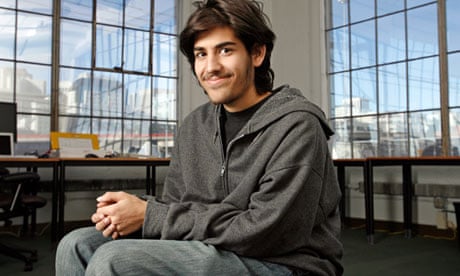
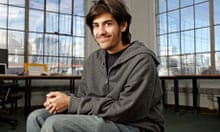
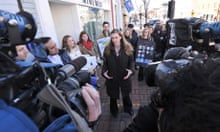


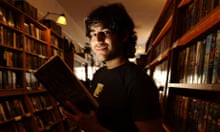


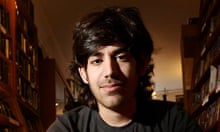

Comments (…)
Sign in or create your Guardian account to join the discussion